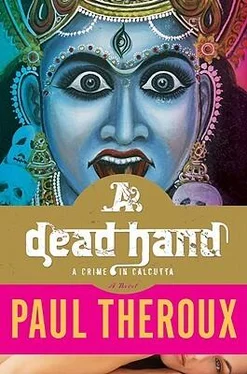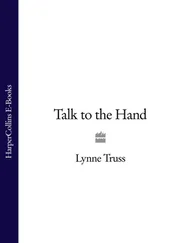"It makes them feel better."
"Right. And the goddess that wrecks and destroys is also the goddess of creation — Kali, the inaccessible." He had stopped reading the Lessing book but still held it, his finger in the pages. "You know the line from Out of Africa ? Africa, amongst the continents, will teach it to you: that God and the Devil are one, the majesty coeternal, not two uncreated but one uncreated.' A very Indian way of looking at the world."
"But in India we're on the outside looking in."
"So true. What was that expression you used in one of your pieces? 'Romantic voyeur.'"
I liked his quoting me after quoting Karen Blixen, not for the aptness of what I said but for the reassurance that if he remembered what I had once written, he was on my side. I needed a friend because we were strangers here, walking through this populous country, on this crowded train, in the bazaars and at the temples, and borne along by the mob, never able to penetrate, never belong, always kept apart as spectators. He was a consular officer; he actually dated his ex-wife, who was at the embassy in Delhi; and he took an interest in Calcutta. But what excuse did I have? Really, I had no business here.
Never in my life had I been in a place that I found at once so worthy of study, so dense, so superficially exotic, with people so likable and talkative, that was at the same time so impenetrable, even repellent. The more I tried to engage, the more I was excluded. Every activity in India, every Indian, every scene, said, You don't belong here and You will never understand , but never explicitly said, Go home. For a foreigner, living in India required complete surrender. We were not rejected, we were mildly tolerated, because foreigners in India always had a use.
"I could watch this for a year and still not understand," I'd said to Mrs. Unger at the Kali temple in Gauhati.
"There is nothing to be understood in India," she'd said. "Only to be accepted."
That had been something else that attracted me to her. Of all the foreigners I met in India, she was the one who was most at home. It was not her sari or her hennaed feet, not even her pieties, though they stuck in my mind: "Ida and Pingala must come into balance to allow the kundalini to rise in the Sushumna channel," or "The skills and benefits of White Tantra practices increase one's ability to master Red Tantra." Nor was it her ability to live among the people and flourish. It was her certainty and her calmness, almost a way of breathing ("pranayama," she would have said) that made her brave.
"Anyone who has not learned to hate India has not spent enough time here. You can never love India — you will be destroyed."
"What then?"
"Respect India as you would a tiger. If not, you'll be eaten alive." Another time, "India is elephantine."
She did not fear anyone in India. Yet most foreigners — Howard and I, for example — were so careful as to seem timid. Mrs. Unger was bold, another of her maternal qualities. She was a protector.
Or so I had thought. I was headed to Mirzapur to find out if any of this was true.
We rocked through the night, and at dawn most of the passengers got out at Mugalsarai, as Howard had predicted. The chai seller ladled milky tea into plastic cups for us, and two hours later we arrived in Mirzapur.
Mr. Ghosh had found our coach and stood outside as we descended to the platform.
"Welcome, welcome."
He carried a briefcase and an umbrella, and seemed, for our purposes, to be overdressed — a suit jacket, a tie, heavy shoes; burdened by the clothes, but it was a uniform. He was defining himself in the Indian way, to impress us with his seriousness, the important weight of his clutter, and he wore two lapel pins. A smudge of yellow dust glittered on his forehead. Emblems of power.
"Good journey?"
Howard said, "Excellent. And we are honored to be here."
"Honor is mine. I am honored to be your guide."
He made no move to take our bags — that was the job of the porter. It would not have occurred to him even to offer. He fluttered his hands at a ragged man, who dived at us and snatched the bags.
"We must have a cup of tea," he said. "Tearoom is adjacent on station platform. We can discuss program."
He unbuckled his briefcase in the tearoom and brought out a map of Mirzapur. This he flattened on the splashed tablecloth while explaining that it was already out of date.
"We're looking for a particular carpet factory," I said.
"So many are there. Big are there. Small are there." He snapped his fingers at a waiter. "What about cakes? What about eatables? Have you breakfasted?"
"Nothing for me," I said, and Howard signaled by raising his hands that he was content.
"What is factory name?"
"I don't know the name, but here's a piece of carpet from it. At least I think it is."
Mr. Ghosh handled it casually, as something valueless, and hardly looked at it. He smiled the smile of the Indian pedant I'd met many times, who enjoyed telling me a thing was impossible, or had no meaning, or could not be properly understood by a non-Indian. Mrs. Unger always had a prompt reply for such people, but I was at a loss.
"No, no, no, no," he was saying.
An Indian man of this sort got more pleasure out of saying that something was impossible than offering to be helpful. Here we had just arrived after fourteen hours on the train and he was telling us we were wasting our time. Being obstructive inflated his importance.
"Many factories make this carpet. It is standard design."
"But we suspect this factory exports goods to America," Howard said.
Seeming to gloat over our naïveté, Mr. Ghosh said, "All factories export to America."
"Maybe we should go back to Calcutta," I said, to see what he would say.
"I can initiate suitable inquiries." He shrugged and looked again at the piece of carpet. "I can chalk it in."
It would have ruined his pleasure to see us depart early, and he could only be compensated if we stayed. If a thing seemed too easy, Mr. Ghosh was of negligible importance. The idea was for him to strike a balance between the impossible and the negotiable.
Howard knew how to handle him. He thanked Mr. Ghosh for meeting us. He expressed the hope that we would find what we were looking for. He said that we were delighted to be in Mirzapur, famous for its textiles, a legend in the carpet industry.
This elaborate politeness had the effect of arousing Mr. Ghosh's civic pride and helping him relax, even if he was not disarmed. Howard was being properly appreciative, but I could see that Mr. Ghosh viewed me (accurately) as impulsive.
I said, "We think there might be child labor involved."
"Child labor is so common." Mr. Ghosh looked defiant.
"One of these children might be dead."
"Who lives forever?" he said, and smiled, pleased with his reply.
"But he was a child."
"Even children die."
"This child might have died in the factory."
He grinned his pedantic grin and rested on the handle of his umbrella. "It is not nursery. It is factory."
"Backbreaking work."
"Excuse me, good sir. Not at all. Weaving work is done with fingers only. Children tie knots. As a Mirzapurian, I am familiar with this work."
"Many children?"
"Lakhs, sir."
Then we drank our tea in silence. Mr. Ghosh had gained the advantage. Instead of guiding us, he was elaborating the difficulties.
But Howard was unfazed. He was attentive, sympathetic, deferential.
"We are ignorant visitors," Howard said. "You're the expert. What shall we do?"
Mr. Ghosh took a sip of tea, sloshed it behind his teeth like mouthwash, and swallowed.
"Familiarization is best," he said.
"How do we accomplish that?"
"Windscreen tour."
Читать дальше












